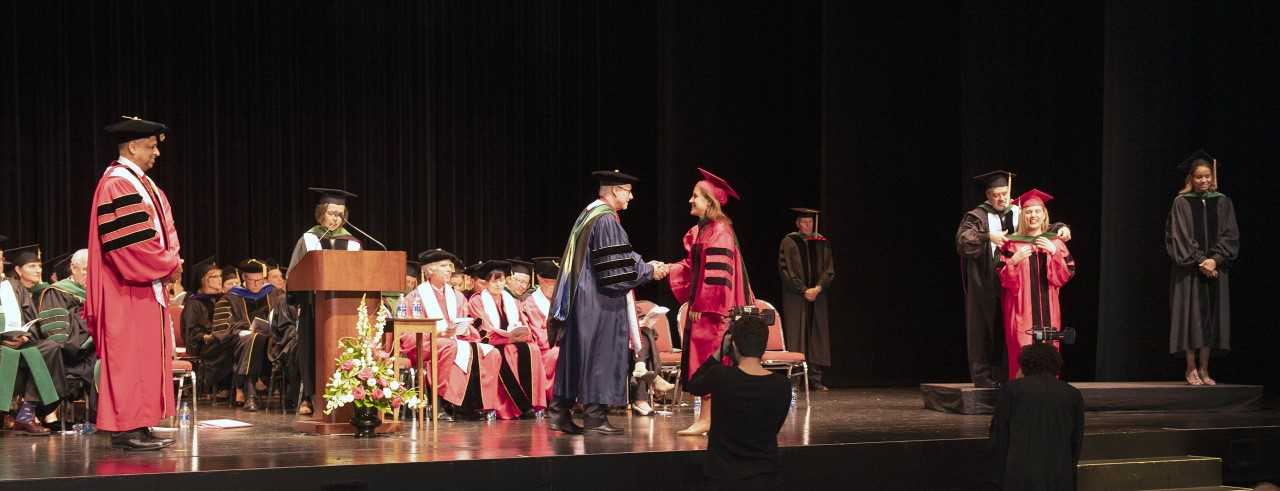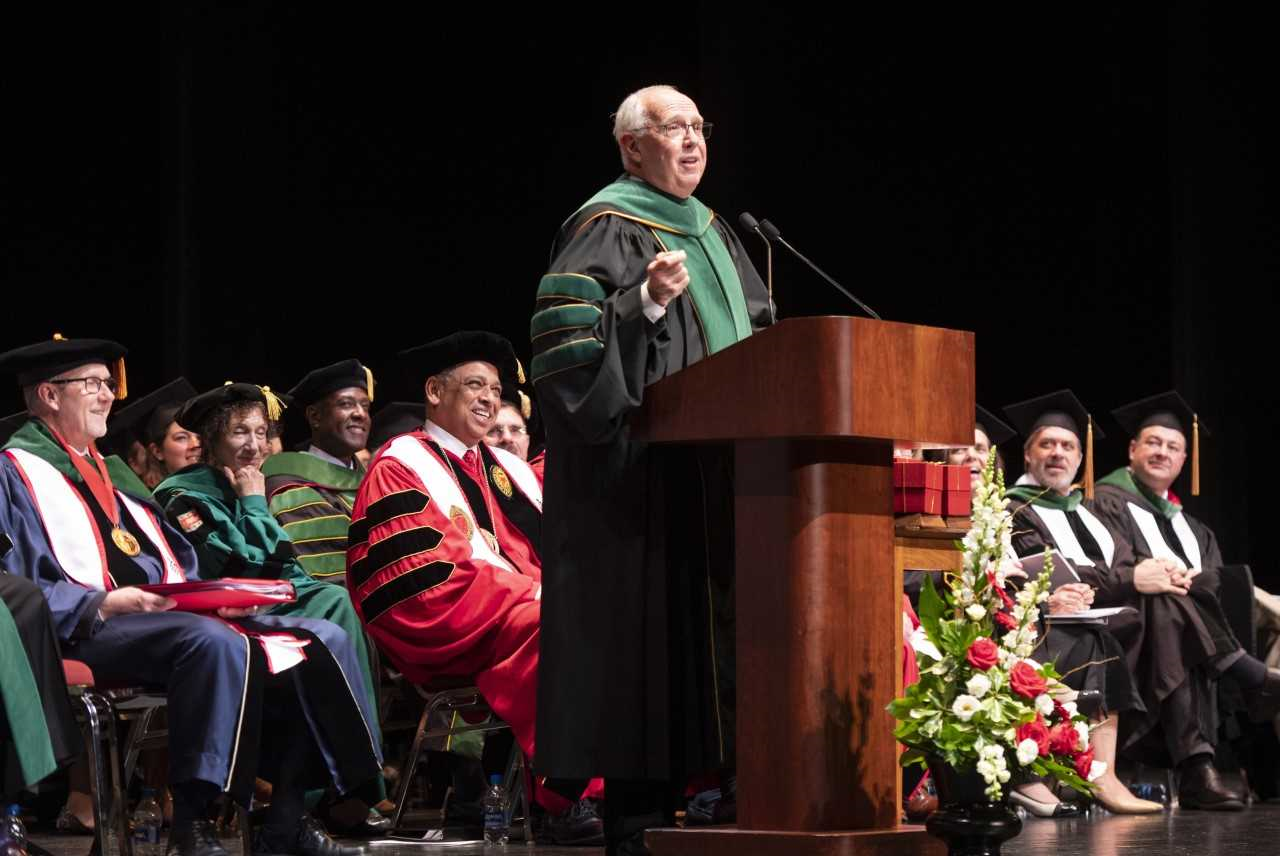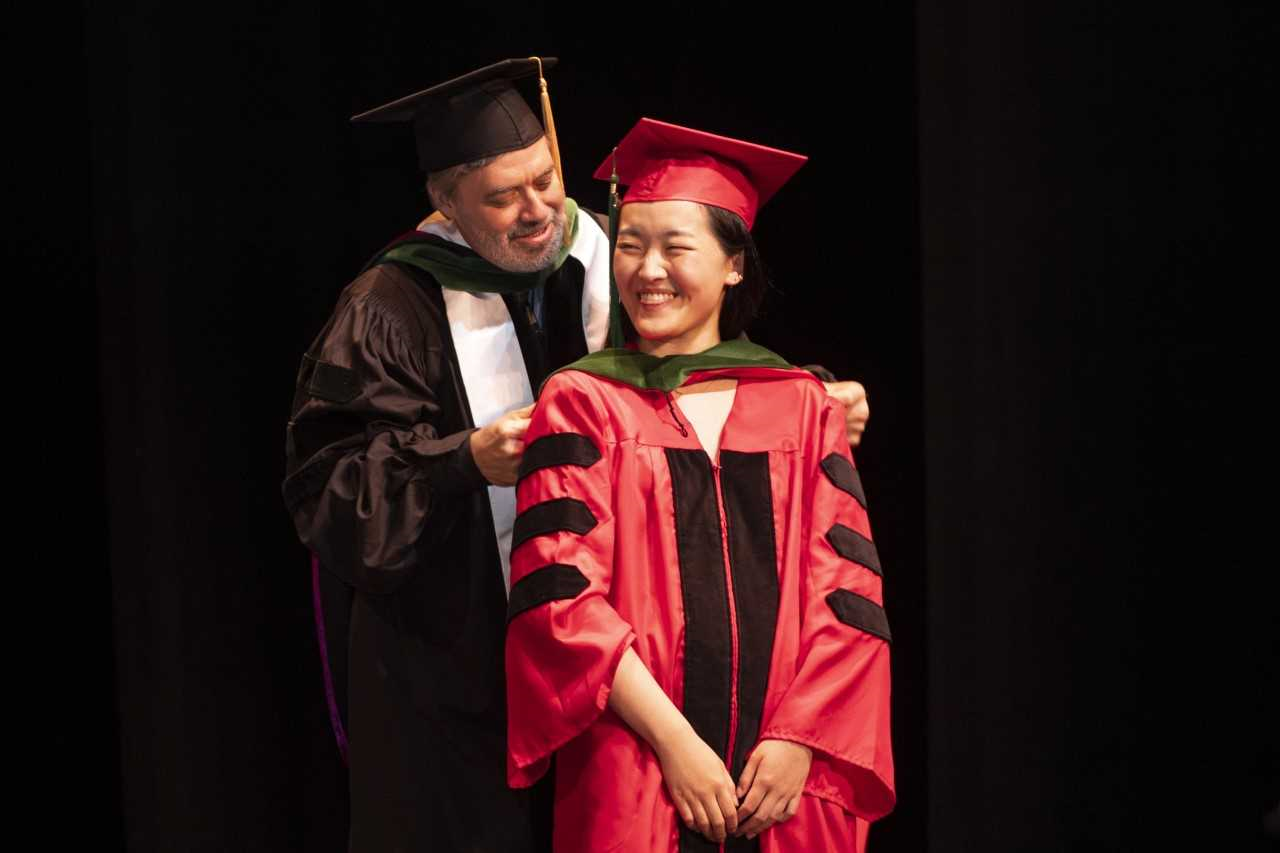
UC College of Medicine celebrates Honors Day 2019
Medical degrees awarded to 185 students, the largest number of graduates at the college since 1988
The University of Cincinnati College of Medicine awarded medical degrees to 185 students, the largest number of graduates in three decades, on Saturday as part of the 201st commencement exercises, known as Honors Day. Nine of the graduating students also received doctorate degrees through the college's Medical Scientist Training Program.
College of Medicine Interim Dean Andrew Filak Jr., MD, welcomed an audience of family, friends, faculty and well-wishers for Honors Day activities at the Aronoff Center. He was joined with opening remarks from UC President Neville Pinto.
“This year the University of Cincinnati is celebrating its bicentennial,” said Filak. “The College of Medicine is where it all began. The charter for the Medical College of Ohio, the precursor to the College of Medicine, was granted by the state of Ohio to Dr. Daniel Drake on January 19, 1819. Although we at the College of Medicine are celebrating our bicentennial, this year’s class actually represents the 201st graduating class at the University of Cincinnati College of Medicine.”
Pinto told graduating medical students they were part of the largest spring commencement class ever at UC with more than 6,600 students receiving degrees.
“To reflect our history and impact we chose Boldly Bearcat for our bicentennial,” said Pinto. “More than a motto Boldly Bearcat is an attitude reaching for excellence by seeking the highest, challenging the norms to achieve something better and living a life of legacy that creates positive impact. As you march today to receive your hoods, two centuries of Boldly Bearcat vision, impact and pride walk with you.”
Pinto said those values were epitomized by Drake, a physician who received little formal education until he apprenticed in Cincinnati at the age of 15 to become a doctor. He urged students to emulate Drake, known as the Benjamin Franklin of Cincinnati, and founder of what would become UC Medical Center. It was the first hospital initiated for teaching purposes exclusively by medical school professors and has been emulated across the nation.
Pinto said Drake offered some important lessons for graduates. “Lesson one, education can occur in some surprising places,” said Pinto. “Drake grew up in Kentucky. He learned by roaming the countryside and taking notes on his observations. He read a dictionary to build his vocabulary and hone his writing skills. Later he translated his use of observation and analysis into his groundbreaking approach into medical education and issue care.”
Pinto urged graduates to continually feed their own innate hunger for knowledge. He also reminded graduates that a legacy life means serving outside of oneself. He cited David Brooks, author of “The Second Mountain: The Quest for a Moral Life” in saying that society puts a great deal of emphasis on “having a good career and a good life.”
“Nothing wrong with that, but be forewarned that focal point can become very inward and consuming,” said Pinto. “Brooks cautioned that sometimes our society has become a conspiracy against joy.”
“He writes: ‘We have become too individualistic when we should be more communal,’” said Pinto. “A life of legacy involves not just the pursuit of happiness but the pursuit of joy.”
Keynote speaker, Darrell Kirch, MD, president and chief executive officer of the Association of American Medical Colleges (AAMC), told new graduates they are becoming physicians during an era of great promise also laden with some serious challenges.
“You are entering a time when America has the best minds in the world. We have the best trained physicians in the world, the best diagnostic technology, the best treatments and people come from all over the world to get those treatments and benefit from those doctors,” said Kirch.
“But I do you a disservice if I wasn’t honest about the concern that I am carrying forward at this point in my career. We also spend more than any other nation. This year we are going to spend $11,500 per man, woman and child on health care,” said Kirch.
“In the United States we are approaching $4 trillion a year. That is an incredible amount of spending, but we don’t have the best health outcomes in the world. We have many more newborns die than we should than in other developed nations do,” said Kirch. “There are some groups in America where life expectancy is actually falling because they are dying prematurely of what some people are calling ‘deaths of despair.’”
“You are experiencing that right here in Ohio with the opioid epidemic,” said Kirch. “Not only that, we have tens of millions of Americans who have no health insurance. I know there people in this room who have no health insurance or your health insurance is so weak you worry that a serious illness might bankrupt you or your family.”
Kirch said the nation is facing a physician shortage with 10,000 baby boomers turning 65 every day.
“We like to refer to ourselves as the silver tsunami,” said Kirch to laughter from the audience. “But we will age and during that aging we will live with more chronic illnesses and it will place a tremendous demand on our system. These are real challenges and we got to be honest with each other about.”
“I am not talking about politics,” said Kirch. “I would argue to you that what I am really talking about is our ethical commitment as physicians. So you just recited the oath you wrote in your first year and at the end of this ceremony you will recite the Hippocratic Oath.”
See coverage of UC College of Medicine Honors Day 2019.
Kirch said the Hippocratic Oath and the Oath of Professionalism written by the graduating class are based on four core principles of clinical ethics: Always seek the best for your patient. Always avoid harming your patients. Respect their independence, it’s their body and decision. Strive for justice in health care.
“You and I both know we have not achieved justice in health care in the United States,” said Kirch. “We have some people who get all the care they need and we have some people who probably get too much care, too many unnecessary tests and the like. Then we have other people that are left out in the cold. You would see those people not when they are coming for preventive medicine or medical care, but when they are so sick that they finally rolled into the emergency room on a gurney and you had to rescue them. There is no way I could consider that a just system of health care.”
“I also know as a nation, as a profession, we are better than this,” said Kirch.
Kirch urged graduating students to become advocates for improving the nation’s healthcare system as new physicians. He says they have already shown their commitment with involvement in medical student initiatives at UC such as the Urban Health Project and the Initiative on Poverty, Justice and Health.
“I would like for us to make a promise to each other,” said Kirch. “I would like for all of us in the profession, I would like all of you to support us in finding the courage to try and get the American health care system to a place where it works well for everybody, not just some.”
Several awards were presented during Honors Day including the Daniel Drake Medal, the college’s highest honor, and the Leonard Tow Humanism in Medicine Awards.
Receiving Drake Medals were Stephan Grupp, MD, PhD, a 1987 UC College of Medicine graduate; Gurjit Khurana Hershey, MD, PhD, UC professor of pediatrics; Myles Pensak, MD, senior associate dean for clinical affairs in the UC College of Medicine; and Marvin Slepian, MD, a 1981 graduate of the UC College of Medicine.
The Leonard Tow Humanism in Medicine Awards are given to both a faculty member and a graduating student in recognition of their demonstrating clinical excellence and outstanding compassion in the delivery of care and for showing respect for patients, their families and health care colleagues.
This year’s faculty recipient was Tiffiny Diers, MD, associate professor of internal medicine and pediatrics. The student recipient will be Andrea Marie Rosado, a fourth-year medical student.
The College of Medicine’s first commencement exercise was held April 4, 1821, and had seven graduates. Since then, the college has awarded more than 15,800 medical degrees. Founded as the Medical College of Ohio, the college joined the University of Cincinnati in 1896 and has held annual commencement exercises every year with the exception of 1823. Two classes were graduated from the college in 1862, 1863 and 1943 to help supply physicians during the Civil War and World War II.
Be the next accomplished Bearcat
Graduates at the University of Cincinnati work in innovative and impactful ways. As part of the university's strategic direction Next Lives Here, UC students and grads achieve academic excellence, maintain an innovation agenda and make an impact in urban areas and around the globe.
Apply to UC as an undergrad or graduate Bearcat and make a difference in the world.
Related Stories
Inflammation, not symptoms, found to disrupt sleep in IBD...
July 9, 2025
Impaired sleep architecture in inflammatory bowel disease (IBD) is primarily driven by inflammatory activity rather than symptomatic flares as previously thought, according to a study published in Clinical Gastroenterology and Hepatology. Sleep architecture is the structural organization of a normal sleep cycle, encompassing the progression and distribution of different stages of sleep throughout a typical night’s rest.
Study traces evolutionary origins of an important enzyme complex
July 9, 2025
MSN highlighted University of Cincinnati Cancer Center research published in Nature Communications that traced the evolutionary origins of the PRPS enzyme complex and learned more about how this complex functions and influences cellular biochemistry.
Hoxworth employees help pen latest edition of textbook widely...
July 8, 2025
Hoxworth Blood Center, University of Cincinnati, is proud to share that four apheresis employees are now published authors. Caroline Alquist, MD, Krystol Weidner, Kelly Anstead and Jamie Swafford helped write Principles of Apheresis Technology, Eighth Edition.


